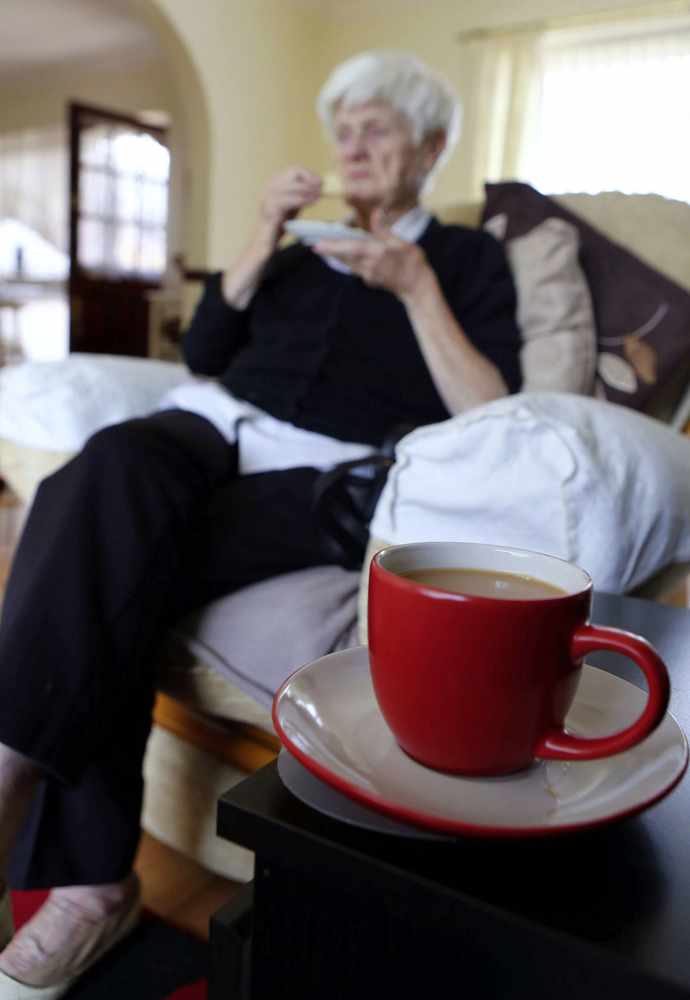- Chairwoman of Age Concern critical of spending cuts announced yesterday to plug a £145m financial black hole
- She says pensioners are always targeted first
- Medium Term Financial Plan read more about the cuts and spending
- Comment: Read what the JEP thinks below
PENSIONERS are always targeted first, says the chairwoman of Age Concern who has criticised a raft of spending cuts proposed in the States yesterday to plug a £145m financial black hole.
The Medium Term Financial Plan includes £70m of job losses in the public sector workforce, as well as scrapping the Christmas bonus of £83.72 paid to pensioners and free television licences in future for the over-75s.
Today, one union spokesman labelled the spending cuts as ‘alarming’ and said the Island unions were due to meet this afternoon to compile a joint response to the proposed cuts.
And the chairwoman of Age Concern, Daphne Minihane, has also spoken out against the proposals.
‘It’s wrong,’ she said. ‘They always target the old people first and get what they can out of them.
‘How many States Members know what it’s like to live on a States pension of £180 a week?
‘Many have to pay rent out of that.
‘Even those who own their own homes have to pay rates, upkeep on things like windows and leaks – even if they have a few pounds in the bank, they need to be able to pay for these essentials.
‘We are not millionaires, but the Council of Ministers talk about people who “do not need” the Christmas bonus, or a television licence – well, there are an awful lot who do, so why should they go without because of the few who do not need it?’
Social Security say that of the £1.5m they are saving from the Christmas bonus payments, £200,000 will be paid towards a private health scheme for the elderly.
But Mrs Minihane said that the scheme was only for people below a savings threshold and was not publicised enough.
The Age Concern chairman said that many elderly people volunteered for charities and also looked after their grandchildren while the parents went out to work to make ends meet.
‘Age Concern gets no money from the States,’ she said.
‘I have to head up committees to help older people, give them a hot meal, make sure they see a chiropodist, have their hair done, with not a penny from the States.
‘Why do they target us all the time, when so much money is being wasted in this Island?’
As part of the proposals outlined yesterday there will also be a new health charge bringing in £35m to the States Treasury and a user-pays charge applied to liquid and solid waste disposal, if the proposition is approved by the States when it is debated in October.
The ministers also propose a freeze on Income Support benefits and a cap on the States grant paid into the Social Security Fund.
The spokesman for Unite the union, Nick Corbel, said all of the unions including teaching unions, the Royal College of Nursing, the uniformed services associations and Prospect, would be issuing a joint response following a meeting this afternoon.
Speaking for Unite members – many of whom may be affected by the extensive job cuts and reorganisation of the public sector – Mr Corbel said: ‘It’s alarming, in that the government are not prepared to look at alternatives to what they are proposing.
‘We have put forward alternative proposals, but the States Employment Board have turned them down.
‘We feel that the zero-ten tax system was a mistake and at that time Unite did put forward its own proposals on future taxation, but these were rejected.
‘Now those who can least afford it have to pay for the mistakes of the past – those with broader shoulders should pay their share.
‘Although members of the public may not realise the effect on them, there will be a rise in stealth taxes, health and user-pays charges, and we do not know where it will end.
‘States services will be severely cut and families will not only have to endure the prospect of rising prices, but also job losses and redundancies.
‘We don’t believe there will be alternative employment in the Island. What kind of jobs will they be – zero hours, minimum wage, not even a living wage, no decent terms and conditions, no sick pay.’
Minding the gap on our public spending
THE States’ new four-year financial plan, announced yesterday, contains details about what the Council of Ministers are proposing to spend on four key areas outlined in the previous States Strategic Plan – education, health, economic growth and St Helier.
It may seem counter-productive to spend at a time when every Islander is being asked to tighten their belts, but ministers say that their economic advisers encourage investment that will bring economic rewards in the longer term, not least by maintaining the Island’s quality of life.
Improving education and training

Education, they say, is important, for two reasons.
Firstly, if Jersey is to compete in a global marketplace, it needs a skilled workforce.
The way to create that workforce is to raise educational standards so that every child reaches their full potential.
However, over the past ten years, they say, academic performance in Island schools has ‘plateaued’.
In order to drive improvements, head teachers are being given the authority to make more decisions about their own schools.
Secondly, the number of children in Jersey is rising and places will be needed in schools to educate them, so some Island schools
will need to be made bigger to accommodate them.
The sum of £9 million has been allocated for additional funding for education over the four-year period, including £3 million a year for IT education and for students who need extra support.
Furthermore, some school buildings are in need of refurbishment.
The capital sum of £55 million has therefore been set aside for building work at Les Quennevais, Grainville and St Mary’s schools.
There will also be stronger links between schools and businesses, to prepare young people for the world of work.

Improving health
The latest estimates suggest that by 2035, there will be 70 per cent more people over the age of 65 than there are today, and twice as many people over the age of 85.
The ministers say that because people are living longer, there will be a greater need in the future to fund expensive new health technology, drugs and treatments.
They intend to put aside up to £40 million of additional annual funds for health and social services by 2019, including:
- £19m to meet increased demand.
- £3m on early intervention to support vulnerable families.
- £2m for mental health services.
- £4m to maintain Health and Social Services properties.
This spending will be paid for by a health charge which will come into effect from 2018 and may mean an increase in the amount Islanders pay into the Health Insurance Fund through their Social Security payments.
However, the ministers say they have not yet finally decided how the funding will be raised.
The Island also needs a new hospital, and proposals will be made shortly about where it should be sited.
Ministers have said that the cost is likely to be significantly more than when the dual-site plans were put forward several years ago, and so a new source of funding may need to be found.
Growing the economy
Looking at the wider world of work, the ministers propose that up to £20 million should be invested in projects that promote productivity, skills, jobs and economic growth.
In particular, the ministers intend to support the technology sector, as well as tourism and the new organisations Visit Jersey and Digital Jersey, as well as the financial services industry.
They are also developing a new rural economy strategy, and efforts by Locate Jersey to attract inward investment will continue.
The sum of £14 million annually to get people back into work after the recession, introduced in 2012, is also to be maintained.
The ministers also say that they will support people and businesses moving to the Island who deliver the greatest economic growth and social value.
Improving St Helier
More housing in the town area and refurbishment of existing social housing will be continued, paid for from the £250 million bond issued during the previous financial plan.
The ministers have also pledged to increase public spaces, improve transport around town and improve parish services, including paying rates on States properties to increase the revenue to the Parish of St Helier.
Capital programme
In all, the capital programme over the four years to 2019 totals £168 million.
The largest sum, apart from the £55 million set aside for schools, is a total £45 million to improve infrastructure, mostly to fund a new sewerage works.
It is for that reason that the ministers want to bring in a new ‘user-pays’ charge for liquid and solid waste – something they say is required in many other places around the world.
They also want to spend £21 million on IT systems so that the States are fully modernised in terms of e-government, which they say will save money in the longer term.
In addition, £27 million is to be set aside in the 2016 Budget for other projects.
Future proposals include prison improvements, consolidation of States offices, and new options for Fort Regent.
The minuses

We are all living longer.
The number of Islanders over 65 will increase from 14,000 today to 28,000 by 2035 – one in four people of the total population.
Currently, there are four working people for every pensioner, but by 2032 there will only be three workers to support each pensioner receiving a States pension from the Social Security Fund.
In 2014, the UK government actuary said that from 2016, pension and benefits costs will for the first time be greater than the amount received in contributions.
If no action is taken, the reserves will be empty by 2046.
The ministers say that a major review is now needed, to be published next year, looking at a number of options including increasing contributions, reviewing the balance paid by employers and employees, increasing the state pension age, looking at who is eligible for a pension and reviewing working-age benefits.
In the short term, ministers are proposing to cap the level of States grant paid into the fund, saving £20 million over the four years. (However, the States will continue to contribute £260 million in grant payments.)
Ministers also want to promote financial independence in old age and encourage more workers to pay into occupational pension schemes, possibly through taxes or benefit rules, and promote work-based pensions for
lower earners.
Pamela Spooner: As an OAP I think that the decision to stop the Christmas bonus is the right thing to do. If you run a business and it is failing do you still give staff a bonus? The bonus is a gift and even as parents if money is tight you do not down spend it on gifts.
Suz Dolbel: ‘Departing’ upper States employees get such large bonuses yet they wish to cut the OAPs bonuses.
Zach Martin: Anyone else thinking the money the states are going to spend on a financial centre would cover this??
Melanie Luce: No Christmas bonus, no TV licence, sewage tax and whatever else will hit the poor pensioner. These proposals will hardly change the lifestyles of the well off but penalise the young and old with limited income. Cruel. Tiered income tax so that those on higher incomes have to pay a bit more should be introduced.
Jaime Boylan: It’s incredibly unfair to those who have paid in their entire lives to have it taken away!! They worked and so they deserve it!! What should be happening is those who are too bone idle to work have their benefits capped until they get off their backside.
Richard Kemp: If those in charge stopped being so wasteful and careless with our tax monies this would not be necessary. Get your house in order. If the SoJ were a business, half of them would have been fired by now. Disgrace.
Jane Buckley: Totally disgusting, talk about looking after themselves.
Paul Troalic: Means test! Sorry but those that can afford it should not be subsidised by those who can’t.

DAPHNE Minihane, the chairwoman of Age Concern Jersey, is quite right to question in today’s front page article why it seems that pensioners are always targeted first when the States proposes cuts.
The potential scrapping of the Christmas bonus and axing of free television licences for the over 75s will hit hard.
Harsh as it may be, the Medium Term Financial Plan will have an impact on all sections of the community and every section must be prepared for its effects, but it does appear somewhat mean to chip away further at the limited benefits our pensioners enjoy.
Ministers must bear in mind that not all pensioners in this Island draw huge pensions and live in luxury.
Would it be too obvious to suggest means testing first, allowing those who are in need to receive what they deserve?
States Members should remember that despite pensioners seeming an easy target, it is this Island’s pensioners that make up the majority of voters and they do not easily forget.







